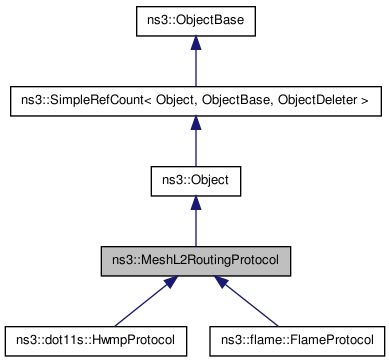Interface for L2 mesh routing protocol and mesh point communication. More...
#include <mesh-l2-routing-protocol.h>


Public Types | |
| typedef Callback< void, bool, Ptr< Packet >, Mac48Address, Mac48Address, uint16_t, uint32_t > | RouteReplyCallback |
Public Member Functions | |
| virtual | ~MeshL2RoutingProtocol () |
| virtual D-tor for subclasses | |
| virtual bool | RequestRoute (uint32_t sourceIface, const Mac48Address source, const Mac48Address destination, Ptr< const Packet > packet, uint16_t protocolType, RouteReplyCallback routeReply)=0 |
| virtual bool | RemoveRoutingStuff (uint32_t fromIface, const Mac48Address source, const Mac48Address destination, Ptr< Packet > packet, uint16_t &protocolType)=0 |
| When packet is ready to go to upper layer, protocol must remove all its information: tags, header, etc. So, MeshPointDevice must call this method when passing a packet to upper layer. | |
| void | SetMeshPoint (Ptr< MeshPointDevice > mp) |
| Set host mesh point, analog of SetNode (...) methods for upper layer protocols. | |
| Ptr< MeshPointDevice > | GetMeshPoint () const |
| Each mesh protocol must be installed on the mesh point to work. | |
Static Public Member Functions | |
| static TypeId | GetTypeId () |
| Never forget to support NS3 object model. | |
Protected Attributes | |
| Ptr< MeshPointDevice > | m_mp |
| Host mesh point. | |
Detailed Description
Interface for L2 mesh routing protocol and mesh point communication.
Every mesh routing protocol must implement this interface. Each mesh point (MeshPointDevice) is supposed to know single L2RoutingProtocol to work with, see MeshPointDevice::SetRoutingProtocol ().
This interface is similar to ipv4 routing protocol base class.
Member Typedef Documentation
| typedef Callback<void, bool, Ptr<Packet>, Mac48Address, Mac48Address, uint16_t, uint32_t > ns3::MeshL2RoutingProtocol::RouteReplyCallback |
Callback to be invoked when route discovery procedure is completed.
- Parameters:
-
flag indicating whether a route was actually found and all needed information is added to the packet successfully packet for which the route was resolved. All routing information for MAC layer must be stored in proper tags (like in case of HWMP, when WifiMacHeader needs address of next hop), or must be added as a packet header (if MAC does not need any additional information). So, the packet is returned back to MeshPointDevice looks like a pure packet with ethernet header (i.e data + src +dst + protocol). The only special information addressed to MeshPointDevice is an outcoming interface ID. src source address of the packet dst destination address of the packet protocol ethernet 'Protocol' field, needed to form a proper MAC-layer header uint32_t outcoming interface to use or 0xffffffff if packet should be sent by ALL interfaces
Member Function Documentation
| static TypeId ns3::MeshL2RoutingProtocol::GetTypeId | ( | void | ) | [static] |
Never forget to support NS3 object model.
This method returns the TypeId associated to ns3::MeshL2RoutingProtocol.
This object is accessible through the following paths with Config::Set and Config::Connect:
- /NodeList/[i]/DeviceList/[i]/$ns3::BaseStationNetDevice/BsIpcsPacketClassifier/$ns3::MeshL2RoutingProtocol
- /NodeList/[i]/DeviceList/[i]/$ns3::BaseStationNetDevice/BsIpcsPacketClassifier/$ns3::MeshPointDevice/RoutingProtocol
- /NodeList/[i]/DeviceList/[i]/$ns3::BaseStationNetDevice/LinkManager/$ns3::MeshL2RoutingProtocol
- /NodeList/[i]/DeviceList/[i]/$ns3::BaseStationNetDevice/LinkManager/$ns3::MeshPointDevice/RoutingProtocol
- /NodeList/[i]/DeviceList/[i]/$ns3::BaseStationNetDevice/SSManager/$ns3::MeshL2RoutingProtocol
- /NodeList/[i]/DeviceList/[i]/$ns3::BaseStationNetDevice/SSManager/$ns3::MeshPointDevice/RoutingProtocol
- /NodeList/[i]/DeviceList/[i]/$ns3::BaseStationNetDevice/ServiceFlowManager/$ns3::MeshL2RoutingProtocol
- /NodeList/[i]/DeviceList/[i]/$ns3::BaseStationNetDevice/ServiceFlowManager/$ns3::MeshPointDevice/RoutingProtocol
- /NodeList/[i]/DeviceList/[i]/$ns3::MeshPointDevice/RoutingProtocol
- /NodeList/[i]/DeviceList/[i]/$ns3::SubscriberStationNetDevice/Classifier/$ns3::MeshL2RoutingProtocol
- /NodeList/[i]/DeviceList/[i]/$ns3::SubscriberStationNetDevice/Classifier/$ns3::MeshPointDevice/RoutingProtocol
- /NodeList/[i]/DeviceList/[i]/$ns3::SubscriberStationNetDevice/LinkManager/$ns3::MeshL2RoutingProtocol
- /NodeList/[i]/DeviceList/[i]/$ns3::SubscriberStationNetDevice/LinkManager/$ns3::MeshPointDevice/RoutingProtocol
- /NodeList/[i]/DeviceList/[i]/$ns3::SubscriberStationNetDevice/SSScheduler/$ns3::MeshL2RoutingProtocol
- /NodeList/[i]/DeviceList/[i]/$ns3::SubscriberStationNetDevice/SSScheduler/$ns3::MeshPointDevice/RoutingProtocol
- /NodeList/[i]/DeviceList/[i]/$ns3::WimaxNetDevice/$ns3::BaseStationNetDevice/BsIpcsPacketClassifier/$ns3::MeshL2RoutingProtocol
- /NodeList/[i]/DeviceList/[i]/$ns3::WimaxNetDevice/$ns3::BaseStationNetDevice/BsIpcsPacketClassifier/$ns3::MeshPointDevice/RoutingProtocol
- /NodeList/[i]/DeviceList/[i]/$ns3::WimaxNetDevice/$ns3::BaseStationNetDevice/LinkManager/$ns3::MeshL2RoutingProtocol
- /NodeList/[i]/DeviceList/[i]/$ns3::WimaxNetDevice/$ns3::BaseStationNetDevice/LinkManager/$ns3::MeshPointDevice/RoutingProtocol
- /NodeList/[i]/DeviceList/[i]/$ns3::WimaxNetDevice/$ns3::BaseStationNetDevice/SSManager/$ns3::MeshL2RoutingProtocol
- /NodeList/[i]/DeviceList/[i]/$ns3::WimaxNetDevice/$ns3::BaseStationNetDevice/SSManager/$ns3::MeshPointDevice/RoutingProtocol
- /NodeList/[i]/DeviceList/[i]/$ns3::WimaxNetDevice/$ns3::BaseStationNetDevice/ServiceFlowManager/$ns3::MeshL2RoutingProtocol
- /NodeList/[i]/DeviceList/[i]/$ns3::WimaxNetDevice/$ns3::BaseStationNetDevice/ServiceFlowManager/$ns3::MeshPointDevice/RoutingProtocol
- /NodeList/[i]/DeviceList/[i]/$ns3::WimaxNetDevice/$ns3::SubscriberStationNetDevice/Classifier/$ns3::MeshL2RoutingProtocol
- /NodeList/[i]/DeviceList/[i]/$ns3::WimaxNetDevice/$ns3::SubscriberStationNetDevice/Classifier/$ns3::MeshPointDevice/RoutingProtocol
- /NodeList/[i]/DeviceList/[i]/$ns3::WimaxNetDevice/$ns3::SubscriberStationNetDevice/LinkManager/$ns3::MeshL2RoutingProtocol
- /NodeList/[i]/DeviceList/[i]/$ns3::WimaxNetDevice/$ns3::SubscriberStationNetDevice/LinkManager/$ns3::MeshPointDevice/RoutingProtocol
- /NodeList/[i]/DeviceList/[i]/$ns3::WimaxNetDevice/$ns3::SubscriberStationNetDevice/SSScheduler/$ns3::MeshL2RoutingProtocol
- /NodeList/[i]/DeviceList/[i]/$ns3::WimaxNetDevice/$ns3::SubscriberStationNetDevice/SSScheduler/$ns3::MeshPointDevice/RoutingProtocol
- /NodeList/[i]/DeviceList/[i]/$ns3::WimaxNetDevice/BandwidthManager/$ns3::MeshL2RoutingProtocol
- /NodeList/[i]/DeviceList/[i]/$ns3::WimaxNetDevice/BandwidthManager/$ns3::MeshPointDevice/RoutingProtocol
- /NodeList/[i]/DeviceList/[i]/$ns3::WimaxNetDevice/BurstProfileManager/$ns3::MeshL2RoutingProtocol
- /NodeList/[i]/DeviceList/[i]/$ns3::WimaxNetDevice/BurstProfileManager/$ns3::MeshPointDevice/RoutingProtocol
- /NodeList/[i]/DeviceList/[i]/$ns3::WimaxNetDevice/ConnectionManager/$ns3::MeshL2RoutingProtocol
- /NodeList/[i]/DeviceList/[i]/$ns3::WimaxNetDevice/ConnectionManager/$ns3::MeshPointDevice/RoutingProtocol
No Attributes defined for this type.
No TraceSources defined for this type.
Reimplemented from ns3::Object.
Reimplemented in ns3::dot11s::HwmpProtocol, and ns3::flame::FlameProtocol.
| virtual bool ns3::MeshL2RoutingProtocol::RemoveRoutingStuff | ( | uint32_t | fromIface, | |
| const Mac48Address | source, | |||
| const Mac48Address | destination, | |||
| Ptr< Packet > | packet, | |||
| uint16_t & | protocolType | |||
| ) | [pure virtual] |
When packet is ready to go to upper layer, protocol must remove all its information: tags, header, etc. So, MeshPointDevice must call this method when passing a packet to upper layer.
- Returns:
- true if packet shall not be dropped, false otherwise.
- Parameters:
-
fromIface the incoming interface of the packet source source address destination destination address packet the packet to be handled protocolType protocol ID, needed to form a proper MAC-layer header
- Attention:
- protocol type is passed by reference, because may be changed
Implemented in ns3::dot11s::HwmpProtocol, and ns3::flame::FlameProtocol.
| virtual bool ns3::MeshL2RoutingProtocol::RequestRoute | ( | uint32_t | sourceIface, | |
| const Mac48Address | source, | |||
| const Mac48Address | destination, | |||
| Ptr< const Packet > | packet, | |||
| uint16_t | protocolType, | |||
| RouteReplyCallback | routeReply | |||
| ) | [pure virtual] |
Request routing information, all packets must go through this request.
Note that route discovery works async. -- RequestRoute returns immediately, while reply callback will be called when routing information will be available.
- Returns:
- true if valid route is already known
- Parameters:
-
sourceIface the incoming interface of the packet source source address destination destination address packet the packet to be resolved (needed the whole packet, because routing information is added as tags or headers). The packet will be returned to reply callback. protocolType protocol ID, needed to form a proper MAC-layer header routeReply callback to be invoked after route discovery procedure, supposed to really send packet using routing information.
Implemented in ns3::dot11s::HwmpProtocol, and ns3::flame::FlameProtocol.
The documentation for this class was generated from the following files:
- src/devices/mesh/mesh-l2-routing-protocol.h
- doc/introspected-doxygen.h
 1.7.1
1.7.1